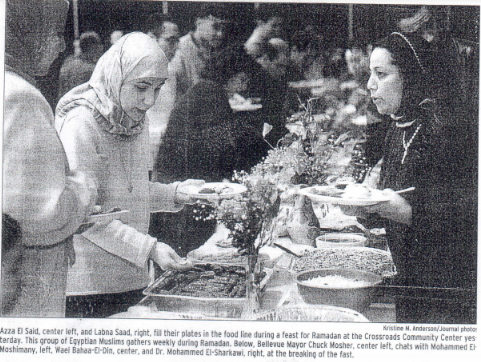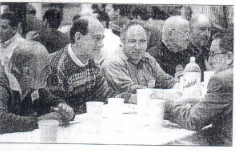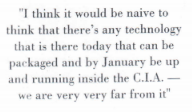Mayor shares food, thoughts with area Egyptians Muslims during Iftar ceremony
BELLEVUE – Food and open dialogue marked a gathering to break the daily fast of Ramadan last night.

A group of 100 Eastside Muslims, mostly from the local Egyptian-American community, broke the fast with Bellevue Mayor Chuck Mosher.
It was the first time Mosher had met with members of the local Muslim community since the Sept. 11 terrorist attacks.
The group meets for an Iftar, or fast-breaking meal, every Saturday during the Islamic holy month at the Crossroads Community Centre gym. It’s a time for adults and children to socialize, eat, play and listen to speakers.
“For most of us this is our family – our extended family,” said Ahmed Zayan, a software engineer at Boeing who is originally from Cairo.
Okra, baba ganouch, stuffed grape leaves, couscous and bread stuffed with tuna and vegetables were among the dishes served on a five-table spread.


Speaker Omar Tawakal, vice president at DigiMine, a Bellevue software company, said the Egyptian-Americans, as an immigrant community, are caught in the cocoon stage – where immigrants begin to amass wealth and gain the respect of other communities. “(Sept. 11) came, and it was a wake-up call to us and other Muslim communities,” he said.
The next step is to build understanding and integrate the ethnic group into the larger community and finally reach a point where there is trust between both groups.
Mosher appreciated the invitation to speak and answer questions, adding that he enjoyed the food.
“Our city appreciates people of faith. These are people that give back to our community,” he said.
Mosher also encouraged Muslims to become involved in civic affairs and discuss with city officials their concerns about issues such as the possible questioning of young Muslims men by federal authorities.
“The strength is through incorporating the values we have throughout the world” he said. “I encouraged you to get involved in that fabric.”
John Arbak, a Port Orchard resident who became a practicing Muslim a year-and-a-half ago and often prays at the Islamic Centre of the Eastside, said now is the time to bridge the gaps of understanding between Muslims and non-Muslims.
“Right now they’re asking questions,” he said of non-Muslims. “We have an opportunity now we have to take advantage of.”
Internet as well faxes, customer responses and documents. The company’s relationship with In-Q-Tel precedes Sept.11, says Vora, but that fact that the nexus now has an added dimensions becomes clear when he declines to comment specifically about the company’s dealings with the DoD, revealing only that he is working under “strict instructions.”
Another company that is working with federal agencies, but declines to reveal details in digiMine, based in Bellevue, Wash. Usama Fayyad, digiMine’s co-founder, president & CEO, believes that data mining is the next generation of data processing technology and is desperately needed in today’s world. Fayyad, who previously worked with the National Security Agency and the C.I.A on an advisory level says that data mining solutions can significantly reduce the number of documents that agencies have to view because it can flag “certain interesting events” based on context, rather than randomly flagging words that appear violent – say “bomb.”

“That capability to apply that extra intelligence to understand data based on context is where data mining can add value,” Fayyad explains. “Because of the volume, you have to be extremely intelligent about which events you flag so that your false negative rate [the number of times you flag an event when there is nothing there] is substantially brought down, without missing any of the true positives.”
This however, requires configuring the algorithms that run through the data specifically to the domain in which they are being used, Fayyad stresses.
Academics in the data mining and information extraction field have also been receiving renewed interest from federal agencies. Rajeev Motwani, a fessor in the department of computer science at Stanford University, is one such individual. The time that Osama bin Laden’s name first emerged was during the embassy bombings in Kenya and Tanzania in 1998. Soon after, Motwani approached the agencies saying that he could do a project to try and identify who is meeting whom and flagging these connections. That could potentially have identified organizations interacting with one another. The project did not work out. However, since Sept. 11, there has been a dramatic shift, as more resources are now being spent on such tools. Pell of WhizBang believes that most of the money spent on intelligence will now be channelled to intelligence technologies.
“Part of this is because the intelligence community has become aware that these guys [terrorist] are using the Internet for their own communications,” Motwani says.
Apart from information extraction and data mining companies, search engines, by their very nature seem to be an obvious choice for the U.S. intelligence community because they deal with large amounts of data and mine them to respond to specific queries. Pell confirms that the government is indeed talking with search engines because they enable it to anonymously monitor sites.
“If you are sitting on a government machine browsing sites then those sites will know that they are being monitored, but a search goes and looks at those sites every day,” Pell explains. “So, if the government can piggy back on top of the search engines, it can do passive monitoring.”
Google, In-Q-Tel and the Defence Advanced Research Project Agency (DARPA) declined requests for an interview.
The Next Six Months
Motwani believes that the next six months will provide a window of opportunity for companies to take advantage of the immediacy of Sept.11. However, he cautions against thinking that because federal agencies are funding these efforts, there will be a quick and easy solution.
“I think it would be naive to think that there’s any technology that is there today that can be packaged and by January be up and running inside the C.I.A. – we are very very far from it,” Motwani says. “The question is, “Can you facilitate the task of the human analyst and provide the tools that will leverage the time better?”
The challenge lies not so much in getting the data, integrating it or processing large volumes and putting it in some canonical form, he argues. The task lies in running efficient algorithms that will be able to make statistical, linguistic and semantic correlation across various data.
Although the next six months will be crucial to see which company can take charge and customize its products for the intelligence community, no one doubts that data mining is here to stay. Referring to Moore’s law, which states that every 18 months the processing capacity in the world doubles, and an empirical law that postulates that the storage capacity in the world doubles every nine months, Fayyad of digiMine concludes that the world has more data than it can process. This makes the adoption of data mining technologies both for government intelligence or business intelligence, inevitable.
“To me it’s not a question ‘if’,” Fayyad says. “To me it’s a question of ‘when’.”
By: Tony Dondero
Source: Eastside Business Journal
